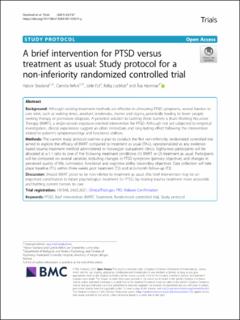| dc.description.abstract | Background
Although existing treatment methods are effective in alleviating PTSD symptoms, several barriers to care exist, such as waiting times, avoidant tendencies, shame and stigma, potentially leading to fewer people seeking therapy or premature dropouts. A potential solution to battling these barriers is Brain Working Recursive Therapy (BWRT), a single-session exposure-oriented intervention for PTSD. Although not yet subjected to empirical investigation, clinical experiences suggest an often immediate and long-lasting effect following the intervention related to patient’s symptomatology and functional abilities.
Methods
The current study protocol outlines a plan to conduct the first non-inferiority randomized controlled trial aimed to explore the efficacy of BWRT compared to treatment as usual (TAU), operationalized as any evidence-based trauma treatment method administered in Norwegian out-patient clinics. Eighty-two participants will be allocated at a 1:1 ratio to one of the following treatment conditions: (1) BWRT or (2) treatment as usual. Participants will be compared on several variables, including changes in PTSD symptoms (primary objective), and changes in perceived quality of life, rumination, functional and cognitive ability (secondary objective). Data collection will take place baseline (T1), within three weeks post treatment (T2) and at 6-month follow-up (T3).
Discussion
Should BWRT prove to be non-inferior to treatment as usual, this brief intervention may be an important contribution to future psychological treatment for PTSD, by making trauma treatment more accessible and battling current barriers to care. | en_US |

